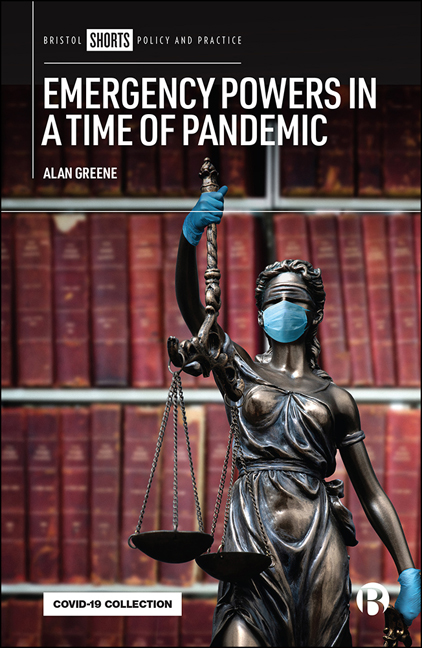Book contents
- Frontmatter
- Contents
- Notes on the Author
- Acknowledgements
- Introduction
- One The Pandemic State of Emergency
- Two Pandemics and Human Rights: Non-Derogable Rights
- Three Pandemics and Human Rights: Derogable Rights
- Four Pandemics and Democracy
- Five The End of the Pandemic Emergency
- Six Conclusions: Breathing Space
- Index
Five - The End of the Pandemic Emergency
Published online by Cambridge University Press: 12 March 2021
- Frontmatter
- Contents
- Notes on the Author
- Acknowledgements
- Introduction
- One The Pandemic State of Emergency
- Two Pandemics and Human Rights: Non-Derogable Rights
- Three Pandemics and Human Rights: Derogable Rights
- Four Pandemics and Democracy
- Five The End of the Pandemic Emergency
- Six Conclusions: Breathing Space
- Index
Summary
Introduction
As pandemics wane, states may be tempted to lift emergency measures as soon as possible. The assumption that the popularity of these measures will wane over time, as lockdown progresses and the pressure to restart economic activity increases, acts as a powerful democratic incentive in favour of a return to normalcy. This stands in stark contrast to national security emergencies such as terrorism where, in general, democratic forces tend to perpetuate emergency powers.
We have already seen the problems that this rush to normalcy may cause in the context of vulnerable parliamentarians in the UK being disenfranchised. The ‘rush to normalcy’ can also result in a spike in infections and a ‘second wave’, causing a significant threat to life and to health, raising the exact same human rights concerns discussed in Chapter Two (Pandemics and Human Rights: Non-Derogable Rights) that justified lockdown in the first instance. The end of pandemic responses and the lifting of lockdown should therefore be much more gradual than their introduction in the first place. Further, it may not necessarily be the case that this process will be linear; retrogressive steps may be needed if infections spike.
This chapter outlines some of the legal issues that may arise as a result of the lifting of lockdown. I use the distinction made in Chapter One (The Pandemic State of Emergency) between containment and mitigation phases of pandemic control, to suggest that lifting lockdowns should entail more containment than mitigation methods. However, despite being less restrictive on everybody's rights, the targeted nature of these containment measures raises its own unique human rights challenges; namely, their potential discriminatory application and their impact on people's privacy and family life. This stage may be vulnerable to ‘suspect community’ tropes being deployed by democratic governments to make decisions regarding who will be most affected by pandemic powers, with the efficacy of such measures being highly questionable. I shall look at three containment measures in particular: contact tracing apps; immunity certificates; and strict quarantines and stricter border controls.
- Type
- Chapter
- Information
- Emergency Powers in a Time of Pandemic , pp. 119 - 144Publisher: Bristol University PressPrint publication year: 2020



